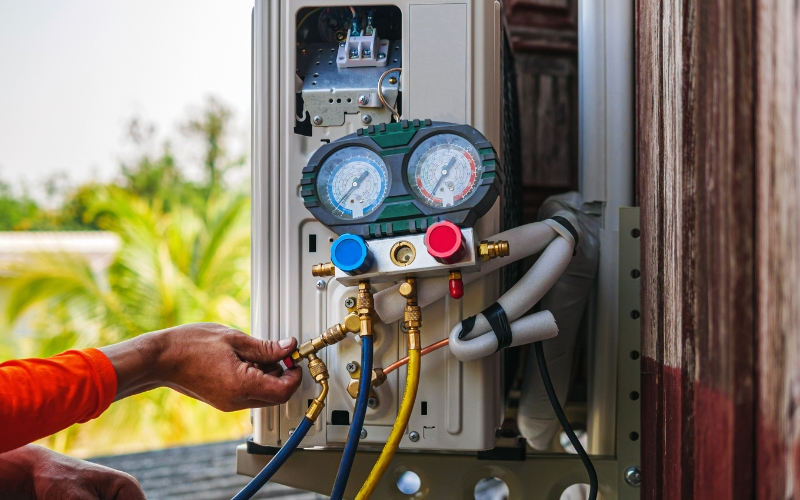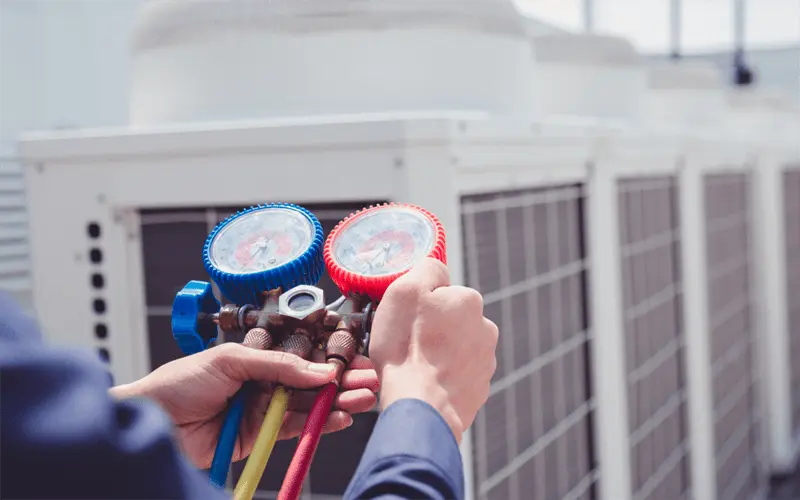AC Compressor Guide: Common Problems and Solutions

Table of Contents
The AC compressor is an essential part of your air conditioning systems since it helps to circulate refrigerants and coolants. There are very many problems that arise from the failure of the compressor and they affect the overall performance of your system. At Prime Genius Heating, Air & Appliances, we know how inconveniencing it can be once your air conditioning system is not working to its full potential whenever the weather is hot. In this guide, we will look at some of the tips that are useful when it comes to diagnosing your AC compressor and come up with probable solutions to the problems that arise to keep your home cool all summer.
How an AC Compressor Works?
When refrigerant exits the evaporator of an air conditioner, it takes the form of a low-pressure gas. To release the heat that the refrigerant has absorbed, it must be in a higher temperature, higher pressure state. The compressor compresses the molecules of the gas-based refrigerant, raising both the temperature and pressure of the refrigerant. Because heat moves from warm to cool surfaces, the heat in the high-temperature refrigerant now moves to the cooler air outside, where it can be released via the condenser.
The cooling process of an AC compressor typically begins with the motor, which powers the entire compressor via a piston and a cylinder. The compressor then raises the pressure and temperature of the vapor refrigerant leaving the coils (evaporator coils). It is critical that the AC compressor raises the temperature of the refrigerant in order to “suck” heat from the home into the condenser. The incoming vapor is then “condensed” into refrigerant liquid by the condenser, which cools the heat. Then, the AC compressor raises the refrigerant’s pressure to enter the indoor unit. This is an ongoing process that is essentially responsible for the constant heat exchange and the cooling effect.
Common Air Conditioning Compressor Issues
Unfortunately, many issues can cause AC compressor failure; however, the majority of these issues are inexpensive to repair. In some cases, the problem is caused by something as simple as a clogged air filter, which prevents proper airflow. Unfortunately, when the AC compressor genuinely fails, the repairs might be so expensive that it may be preferable to purchase a new AC system entirely.Your AC compressor is an expensive component of your system – but not all causes of compressor issues require costly fixes. That’s why scheduling fast home ac repair service for potential compressor issues is critical. What common AC compressor issues should you watch out for?
Suction Line Sizing Problems
Improper suction line diameters are typically the result of unqualified technical labor. If the line is too large or too small, the air conditioning compressor may fail, necessitating costly repairs. Again, a seasoned technician’s knowledge and experience go a long way toward ensuring that an AC system performs well and for a long period.
Having Too Much Refrigerant in The AC
Just like installing suction pipes of the wrong size, unqualified techs may also use a refrigerant type that doesn’t work for your system. Or, there are instances where homeowners choose to perform minor tune-ups by themselves and fill the system with too much refrigerant, unintentionally causing severe damage to the AC compressor.

AC Compressor Electrical Problems
Experts will agree that these are probably the most expensive repairs, as electrical damage may cause permanent problems to the entire system, not just the compressor.
When electrical problems happen, additional acids tend to build up that are potentially hazardous to the entire system. Still, with routine tune-ups, electrical errors can be simply prevented. An expert technician will inspect the whole system for damaged fuses, faulty wiring, and acid buildup to keep your unit in working order.
When system components wear out and leaks cause refrigerant levels to drop, your system has to work harder to push freon through the system, eventually wearing out the compressor.
Debris and Dirt from Outdoors
Outdoor contaminants such as leaves, bird droppings, dirt, debris, acids, moisture, and air are frequently the main culprits responsible for harming the compressor.
Oil Lubricant Issues
Lubricant levels function similarly to refrigerant levels. Inadequate or excessive amounts of these lubricating oils might cause inappropriate system function, which may result in compressor damage. Fine-tuning the amount of lubrication oils is also a job best left to the pros.
The Importance of Regular Maintenance and Checkups
The easiest approach to avoid future compressor issues is to have a team of professionals inspect and tune your unit on a regular basis. Proper maintenance is necessary not just to avoid costly repairs and to maximize the lifespan of your air conditioner or HVAC system, but also to ensure that the air in your house is clean.
As such, hiring certified experts to take care of your HVAC or air conditioning system is always a smart move and a good investment. And if you want to work with the best, feel free to give us a call at (916) 800-4007, and we will help you with everything AC-related, let that be maintenance, servicing, fixes, or replacement.







